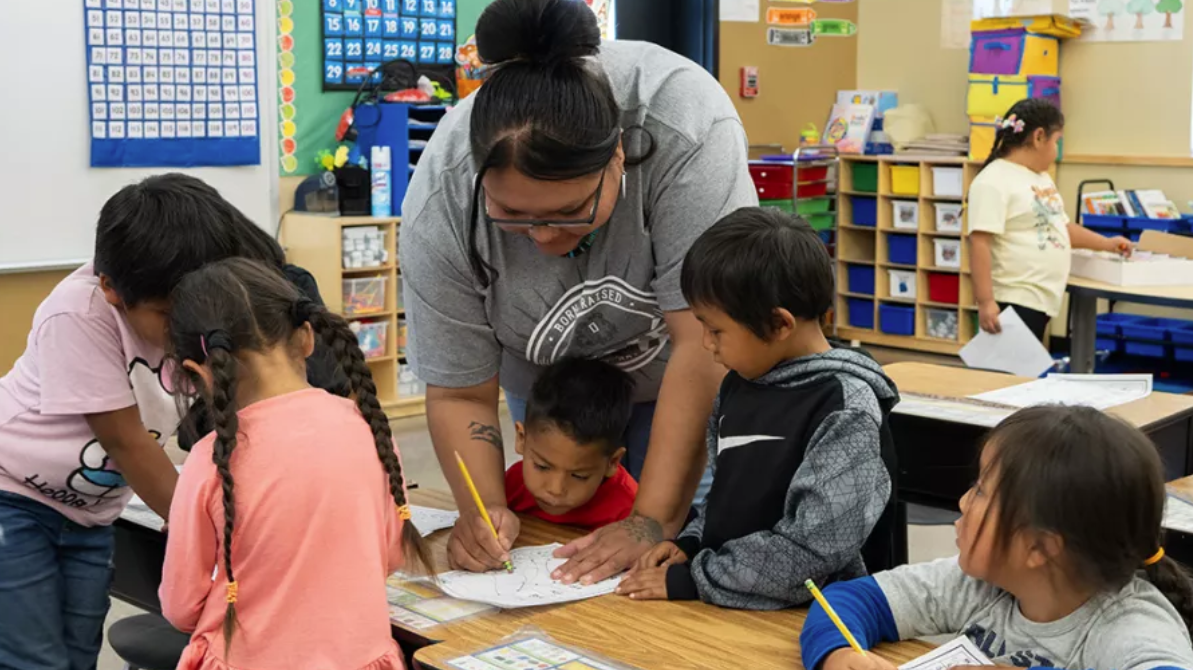
- Details
- By Native News Online Staff
In wake of Tuesday's announcement that the Trump administration is dismantling the U.S. Department of Education, the American Indian College Fund is warning that the Trump administration’s plan to transfer more than a dozen federal education programs to other agencies could jeopardize Native students’ access to critical services and undermine the federal government’s trust and treaty obligations.
On Tuesday, the administration announced that it intends to relocate programs currently housed within the U.S. Department of Education to the Departments of the Interior and Labor, with others shifting to Health and Human Services and the State Department.
Native educators and tribal leaders said the proposal raises concerns about funding stability, staffing, and the quality of education delivery for American Indian and Alaska Native students across K–12 and higher education.
“Only Congress has the authority to dismantle the Department of Education,” the College Fund said in a statement. It criticized the administration’s plan to use interagency agreements to shift programs while keeping funding and partial oversight within the department, calling it “an attempt to bypass Congressional authority.”
The group noted that key programs supporting Native students — including the Office of Indian Education, which oversees the federally mandated National Advisory Council on Indian Education — could be disrupted or weakened under the restructuring.
The College Fund also said the administration failed to consult tribal nations and provided little clarity about how transferring post-secondary oversight to the Interior Department would affect tribal colleges and universities. The Bureau of Indian Education, which already faces longstanding challenges, is housed within Interior.
“Any move regarding Native education, including tribal colleges and universities, must uphold the federal government’s trust and treaty responsibility to provide education for Native people,” the statement said.
While the administration has argued that giving states more control over education policy would improve outcomes, tribal leaders counter that states are not parties to federal treaties with Native nations.
“It is the federal government’s legal relationship with the Tribes alone, and that relationship cannot be outsourced,” the College Fund said.
The organization urged close monitoring to ensure the stability of tribal colleges and continued access to quality higher education for Native students, calling it essential to the “sustainability of our families, community, and future.”
More Stories Like This
Hanging a Red Dress for Christmas: MMIP, Native Higher Education, and Hope for a Better New YearNative Students Can Win $5,000 Scholarship, International Distribution in Pendleton Design Contest
MacKenzie Scott Foundation Gives $5 Million Contribution to Little Priest Tribal College
Tribal Leaders Push Back on Dismantling of U.S. Department of Education
Help us defend tribal sovereignty.
At Native News Online, our mission is rooted in telling the stories that strengthen sovereignty and uplift Indigenous voices — not just at year’s end, but every single day.
Because of your generosity last year, we were able to keep our reporters on the ground in tribal communities, at national gatherings and in the halls of Congress — covering the issues that matter most to Indian Country: sovereignty, culture, education, health and economic opportunity.
That support sustained us through a tough year in 2025. Now, as we look to the year ahead, we need your help right now to ensure warrior journalism remains strong — reporting that defends tribal sovereignty, amplifies Native truth, and holds power accountable.
 The stakes couldn't be higher. Your support keeps Native voices heard, Native stories told and Native sovereignty defended.
The stakes couldn't be higher. Your support keeps Native voices heard, Native stories told and Native sovereignty defended.
Stand with Warrior Journalism today.
Levi Rickert (Potawatomi), Editor & Publisher


